Growing a blog is an effective marketing strategy that helps you gather a niche audience for your website, drawing it closer to your company’s services. When done correctly, you can generate conversions for your business.
However, growing a blog isn’t as simple as getting lucky with a viral content piece. You have to look for engaging topics that you know will be read by your audience so they’ll go to your site in the first place.
Finding content topics might be a bit of a challenge. The good news is that there are some practical ways to find engaging topics to grow your WordPress blog.
Table of Contents
- Google Trends and Alerts
- Tap Into Keyword Research
- Communicate with the Audience
- Social Media Platforms
- Hashtag
- Google Search Console
- Online Communities
Google Trends and Alerts
Let’s pretend you’re building a WordPress blog for dedicated bird owners. You may not know anything about aviaries. One way to start is by learning what people in your niche would be searching for.
Once you know what queries and keywords people in your niche are typing, you can create content around those terms. Utilize Google Trends and Google Alerts so you’ll always have fresh blogging ideas. Google Alerts is relatively easy to set up – just go to the website and type in your topic.
You’ll receive email digests containing trending content every couple of days. You can also set up Google Alerts as an RSS feed for the chosen topic. This way, the content will go to your RSS reader, so you don’t risk losing it because of the usual inbox size limits or spam filters.
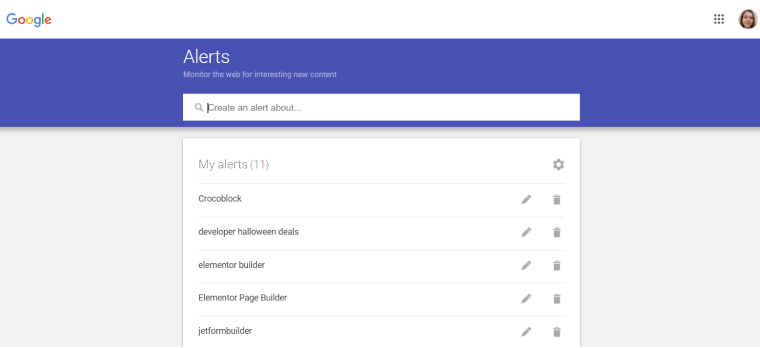
On the other hand, Google Trends lets you monitor interest in your topic over a specific time frame. It also enables you to break down the search performance of your topics by location.
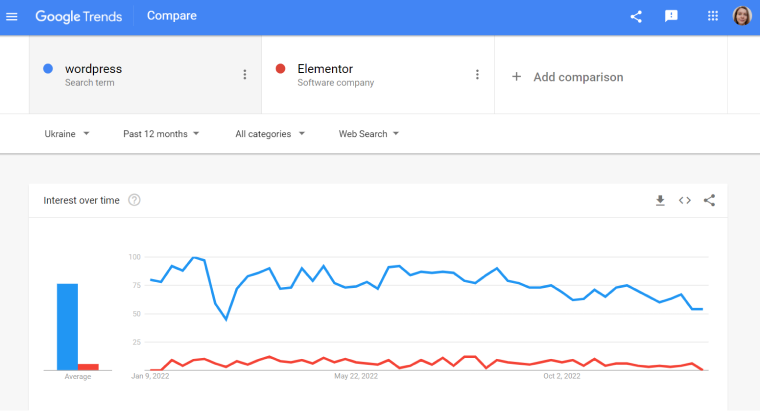
Google Trends allows you to input a search term and see the search volume for that topic. It also shows you the locations of those who search those topics, along with related queries. You may filter to see results from the past hour or year.
Google Trends and Google Alerts are free ways to stay on top of trending topics within your niche. However, there’s more to looking for content ideas than just seeing what’s trending.
Tap into Keyword Research
Keyword research is crucial when looking for topics. You’d want to write about topics that people would search for so they’ll read your articles. The result is that these articles will drive traffic to your website and improve your SEO for those search queries.
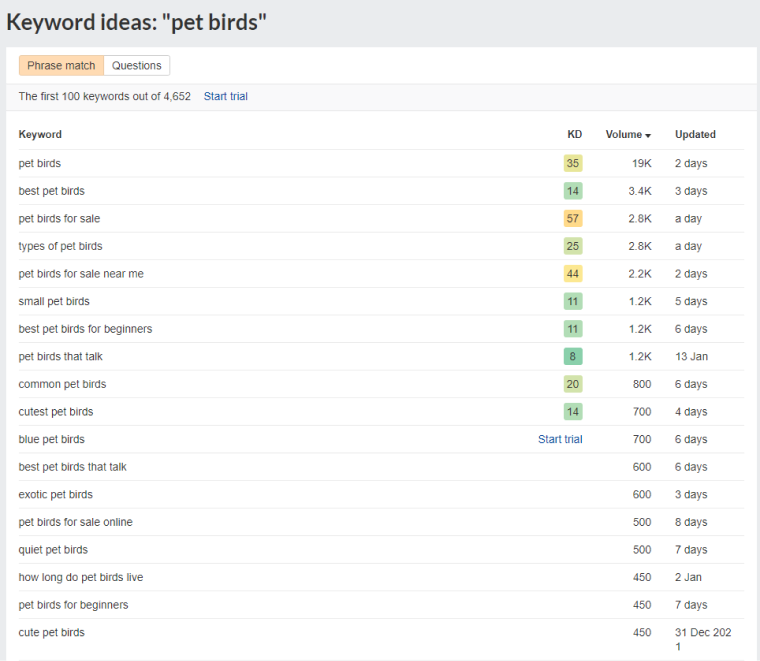
They also reveal the monthly search volume (MSV) for those search queries. Here are two reasons to monitor the MSV for your chosen keywords:
- It’s more challenging to rank high in search engines for search terms with high MSV (above 250 searches per month). Although high rankings will increase traffic for your site, it will be harder for your content to rank with those keywords in the first place. That’s because your content will compete with many other websites using the same terms.
- It’s easier to rank for search terms with low MSV (below 250 searches per month). You’ll have better chances of showing up on the first page of search engine results when you create topics optimized for low-MSV terms because fewer sites want to rank for them.
Here’s why you want to rank for low-MSV search terms.
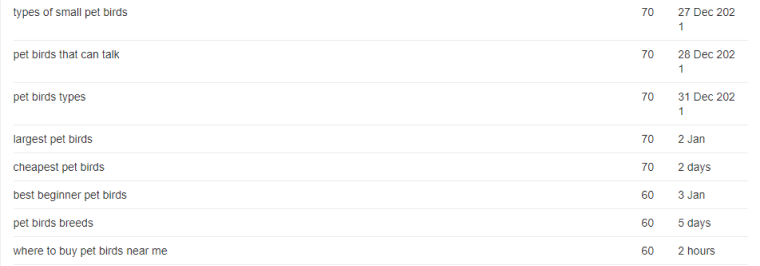
Most low-MSV keywords are long-tail keywords. These are longer, more specific search terms. They include “pet birds that can talk,” “types of small pet birds,” and “cheapest pet birds.” Because they answer specific user questions, your content can enjoy a higher click-through rate (CTR), and you have more chances to reach your target audience.
So, based on our previous example, you may want to write content that revolves around the following topics:
- 10 Small Birds that Can Talk
- 10 Cheap Birds You Can Own Right Now
- How to Teach Your Bird to Talk?
However, I’m not suggesting that you avoid high-volume keywords altogether. If your content is relevant and optimized correctly, it can rank high for these search terms and generate a lot of traffic to your site, particularly if it has a high domain authority score.
If you’re attempting to rank on the first page of search engine results, make sure your WordPress blog is of top-tier quality. Proofread and edit your blogs, and check for plagiarism.
Here are the three popular keyword research tools for increasing organic traffic to your sites.
Ahrefs Keywords Explorer
The Ahrefs Keywords Explorer analyzes how hard it would be to rank in the top ten Google results for given keywords. It assigns a “keyword difficulty” score to keywords from 1 to 100, with one being the easiest and 100 the hardest to rank high.
When searching for information about a keyword that contains a broad topic, Ahrefs’ search engine will give you hundreds of “child” topic keywords. You can apply a keyword difficulty filter to show low-competition keywords related to the topic. When you choose a keyword, Ahrefs will show you how many backlinks you need to bring your blog to the first page of Google.
Ubersuggest
Ubersuggest is a free SEO tool for generating keyword ideas. It is straightforward to use as you only need to put your topic of interest in the search field to get hundreds of keywords for engaging posts.
Each suggestion comes with valuable data: keyword MSV, CPC (cost per click, if you wanted Google to show you content as an ad), and SEO difficulty (estimated competition in organic search, ranked 0-100). By choosing a specific option, you get access to a new set of long-tailed keywords for your blog.
Google Keyword Planner
Google Keyword Planner is a popular tool for running marketing campaigns. The free GKP version lets you find keywords related to your topic using Google data. The search results are ranked according to their relevance to your subject.
Although GKP doesn’t provide precise information about keywords traffic volumes or competition rates, it can be a good starting point for keyword research.
Communicate with the Audience
Knowing your audience will save you time by not writing posts nobody wants to read. Interact with your readers to discover their preferences, and rethink your site’s structure and the types of content you produce. Most importantly, use various communication channels to get inspiration for new engaging blog topics.
Audience comments
After you’ve written your blogs, avid readers will leave insights in your Comments Section. They may point out some things you missed, some things they hoped to see, and may even refute some of your claims. These comments should be more than just idle observations coming from your readers, as they can inspire you to write new articles.
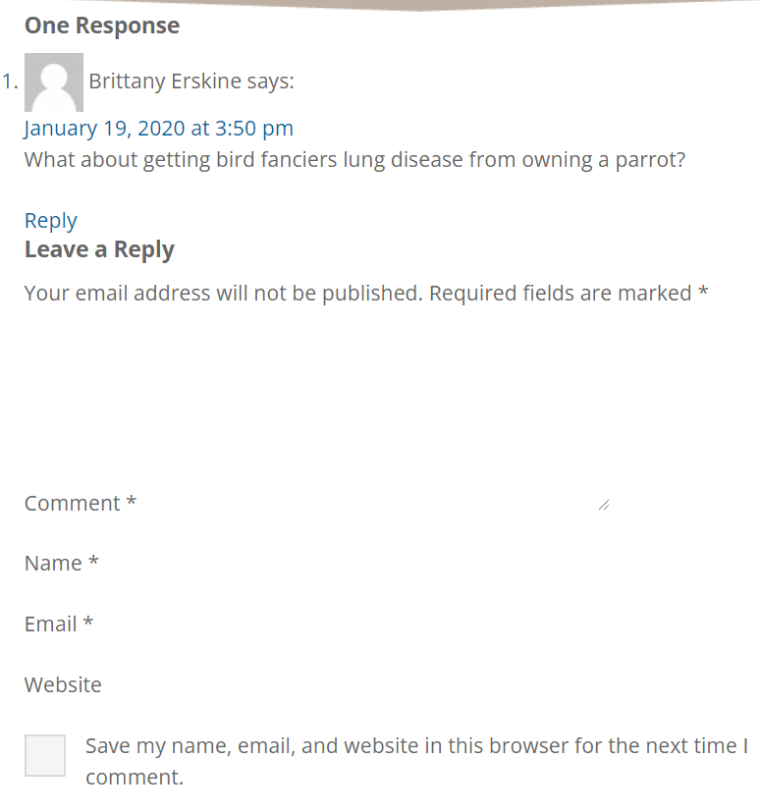
There’s a comment about bird fancier’s lung on this parrot blog – a disease contracted by inhaling bird droppings. Based on this comment, you could make a blog post along the lines of “10 Critical Considerations Before Owning a Bird” or “10 Important Cons to Know Before Owning a Bird.”
Those commenting on your blog posts are your most engaged audience. Take due consideration of their comments, and you’ll never run out of topics to write about. You may even find yourself writing more content tailored to your niche as a result.
Survey your audience
Another reliable method to find engaging topics for your blog through interaction with the audience is using surveys. Surveys, questionaries, quizzes, and tolls have many benefits – creating a special bond with website users, conducting market research, establishing a positive image for your business, etc.
Most importantly, surveys can help you improve your blogging strategy and develop new topics. Your audience will be happy to answer questions if they know you will produce more relevant content. You can ask people directly what they want to read about or put out short evaluation forms to determine if users engage with your past texts. Either way, surveys are a superb way to focus your writing efforts, provided your blogging site already has an audience.
Luckily, there are many free and premium WordPress plugins for creating surveys from scratch or using ready-made templates.
Social Media Platforms
Social networks like Facebook and Instagram are another excellent source of inspiration for your content. However, you need to filter out the noise to find valuable ideas for your content marketing campaigns. How do you discover engaging topics for your blog on Facebook or Instagram?
First, you can tap into your own social media connections. Some friends might have something to share about the niche you’re writing for. For instance, your friend Chloe might have a pet bird that she posts about regularly. Following her and seeing fellow bird lovers comment on her posts will help you get immersed in their world.
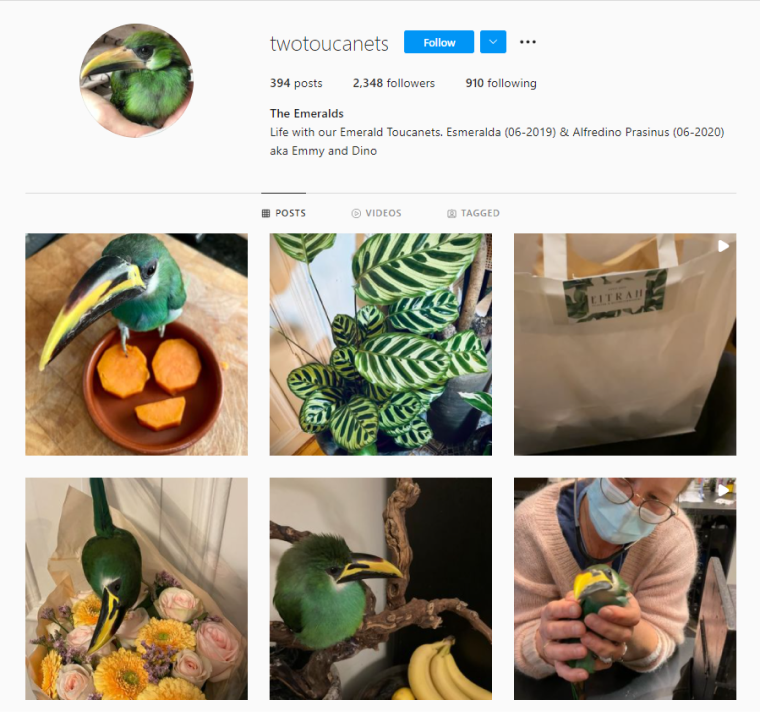
Another way to look for inspiration is by following pages in your niche with high follower counts. These pages are successful mainly because they feature content that people find attractive. For example, you can follow @twotoucanets on Instagram to learn more about toucans and taking care of them.
Hashtag
Hashtags help organize social media posts and content on the Internet by topics. You may search on Instagram, Twitter, or Facebook for a specific hashtag, and these sites will show you all the posts containing that hashtag.

Searching for the hashtag #petbird fetches the above results. You’ll be greeted by posts of various pet owners proudly showing their feathery friends. Click on any of these posts and see what hashtags they contain other than #petbird.

This one above, in particular, uses the hashtags #cockatiel, #talentedpets, #talkingbird, #birdsofinstagram, and #dancing, among others. Some tags are unique to the user, such as #TaakoTime (which refers to the bird in the photo). Searching for these other hashtags will bring you to another list of topics still within the bird domain.
Based on your research, you can write blog posts such as “Why Do Birds Dance?”, “Cheapest Birds that Talk,” or “How to Train Your Bird to Perch on Your Hand?”.
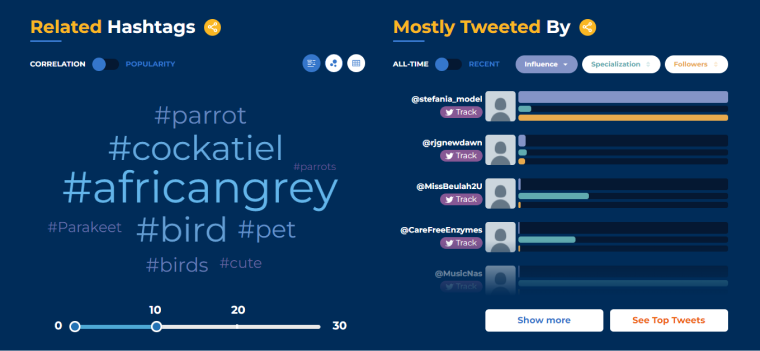
Additionally, you may use software such as Hashtagify and Ritetag to monitor select hashtags. Hashtag monitoring software shows you valuable data such as hashtag use per hour, what time of day people use the hashtag, and what relevant hashtags are starting to trend.
Hashtags also allow you to discover communities you may check out. We’ll discuss taking inspiration from online communities later in this article.
While applying hashtag keyword research seems straightforward, you may want to refine your search and filter your news feed on social media. Instagram allows 30 hashtags on one post. The authors often use too many hashtags to attract potential users and include popular options that are hardly related to a subject you’re interested in.
For example, imagine you’re looking for content about pet birds on Instagram to find inspiration for your blog, where you already have enough material about parrots. If you just use the #petbird hashtag, you will likely see many parrots. It is easy to reduce topics you’re not interested in by blocking hashtags. Select and repeat blocking on a few posts that include the hashtag to teach the algorithm which content you want to see in the future.
Google Search Console
Your site may already have had some visitors. Google Search Console helps identify these visitors’ search queries to arrive at your WordPress website. You can create content around those search terms and other related keywords.
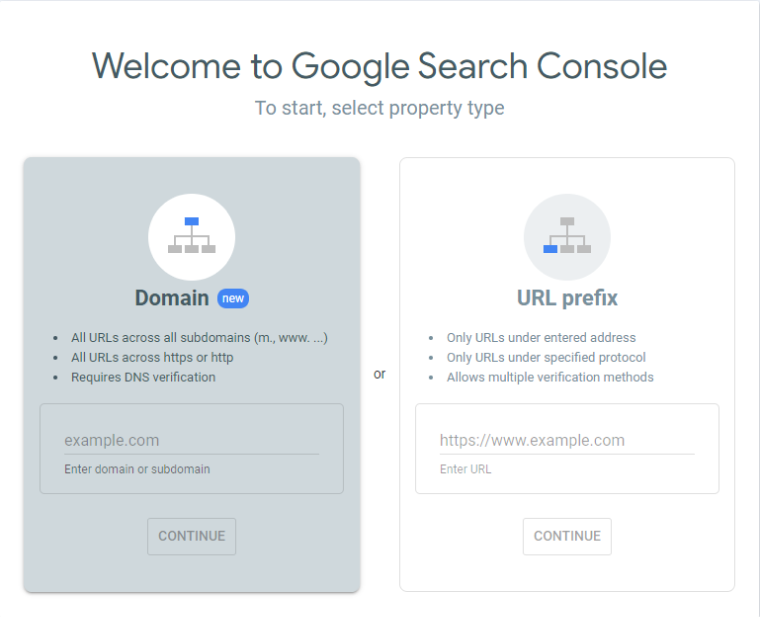
To start, set up your website with Google Search Console and claim ownership of the domain you’ll be using. Go to the Search Results tab in the performance section of the Google Search Console. Scroll down, and you’ll see all the search terms that your WordPress blog’s pages rank for.
Below is an example from Ahrefs, a keyword research software solution.
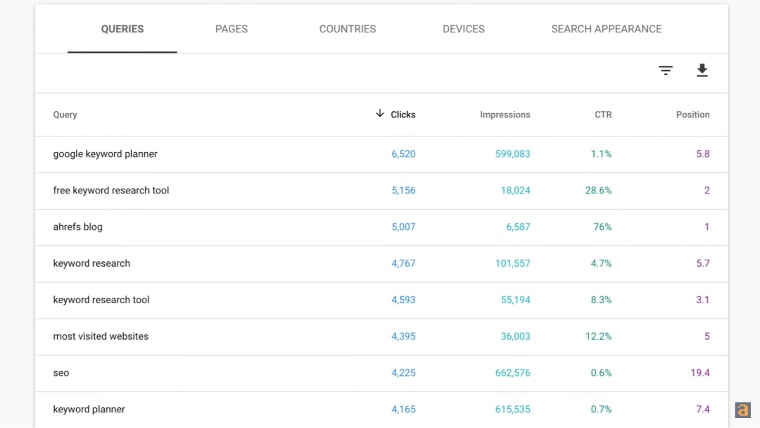
You can see that they’re ranking for the queries “google keyword planner,” “free keyword research tool,” and “keyword research tool,” among others. Based on that, they can create more content about keyword research tools.
Online Communities
Online communities are groups of people with similar interests. You’ll often find interesting questions and insights in these groups that you may use as topic inspiration.
Look into these online community platforms:
- Reddit is a network of online communities (called subreddits) bringing together people with specific interests or hobbies.
- Quora. Use this question-and-answer website to get an idea of what questions people from your niche commonly ask.
- Facebook Groups bring together people of similar interests across Facebook.
- Discord Servers are online chat platforms where hobbyists communicate with each other.
- YouTube is a platform where several communities share exciting videos. Just look at the comments section of a specific video.
Online communities often contain answers that search queries can’t provide.

In the above example, a bird owner and enthusiast asked the cockatiel Reddit community if bird screeching was typical of its species. He also showed a video of his cockatiel screeching and flying around his house. Though this may seem like an innocent query, you could take something out of this and write a blog post on the “5 Reasons Why Your Bird Is Screeching,” for example.
Reading comments to community posts may also provide you with valuable data.

For example, some YouTube commenters share their experience acquiring their cockatiel in this cockatiel tips video. Let data like this inspire your next topics or lead you to research deeper into another area of interest (such as rescue birds, other bird types, etc.).You may even take it a step further. If you find the contact information of any of the people in the community, you may send them an email and ask them about what topics they’d be interested in reading. You’d be surprised at how many people respond to those random emails. Just make sure you track sent emails and don’t send the same email twice to the same person.
FAQ
In SEO, monthly search volume refers to an estimate of how many times a particular keyword was entered into a search engine in a month.
The most popular free keyword research tools are Ahrefs Keyword Explorer, Ubersuggest, and Google Keyword Planner.
Because WordPress is a user-friendly content management system with limitless capabilities, it is preferred by most well-known bloggers.
Long-tail keywords target a narrower audience and provide a higher click-through rate.
In Closing
If you create engaging topics, people are more likely to visit your site. That means your WordPress blog has a better chance of generating conversions.
But coming up with exciting topics for your WordPress blog can be challenging. The good news is that there are strategies you can use, and you learned some of them from this article:
- Use Google Trends and Alerts to stay on top of trending topics. These tools will give you fresh and relevant writing ideas.
- Keyword research will provide insight into what users in your niche are searching for.
- Google Search Console lets you see what search queries your website visitors have looked up to arrive at your domain.
- Hashtags and social media platforms will show you what kind of content your niche consumes.
- Online communities can give you a deeper look at your chosen niche.
- Comments and surveys on your blogs may help you develop new topics.
The Internet is a goldmine of engaging blog post topics that can help you grow your WordPress blog, trust me. Implement these strategies, and you’ll find them.



